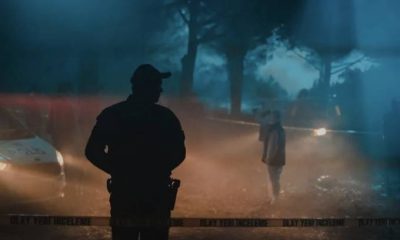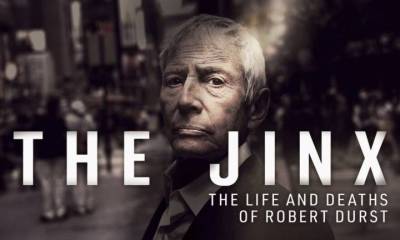Features
Carol Reed Master Storyteller
After several impressive films in the Thirties, Carol Reed came into his own after the war with four great triumphs – dark, brooding tales of intrigue that powerfully caught the prevailing mood of disillusion. These and other pictures reveal Reed as one of the cinema’s master story-tellers.
In the immediate post-war period Britain had no film director more highly regarded than Carol Reed. For three successive years the British Film Academy singled out his films as the best native produce: Odd Man Out in 1947. The Fallen Idol in 1948, The Third Man in 1949. He was knighted in 1952. a rare honour for a director working full-time in the cinema. And he was knighted with reason. For he had achieved what had long seemed an impossible dream for the British cinema – to make films that could stand up internationally with hoth audiences and critics.
Theatrical Beginnings
Like many other talents working in the British film industry. Reed began his career in the theatre. He was born in London in 1906 and by 1923 he was carrying spears and touring in repertory. Eventually he found permanent work with crime-writer Edgar Wallace who was engaged in organising theatrical versions of his stories. Reed served as an all-purpose aide – acting, stage-managing and looking after touring companies.
When Wallace joined the board of the newly established British Lion film company in 1927 Carol Reed became his cinema aide too, keeping an eye on the day’s activities at Beaconsfield studio where film versions of Wallace’s successes were put into production. From Reed’s own films it is clear what he learned from his days with Wallace – a firm belief in telling a good yarn and a delight in the murkier side of life.
After Wallace died in 1932, Reed joined Associated Talking Pictures (later to become Ealing). In 1935 he directed his first film Midshipman Easy, a full-blooded maritime adventure with 15-year-old Hughie Green (the future television star) leaping about the high seas with disarming glee. Margaret Lockwood in A Girl Must Live
For most of the Thirties Reed moved rapidly from one studio project to another, gaining some critical attention for the energy of his shooting style, Laburnum Grove (1936) was based on J.B. Priestley’s play about English suburban life; A Girl Must Live (1939) was a jolly showbusiness comedy featuring the charms of Margaret Lockwood and a mordant Frank Launder script.
Finding his way
More substantial were Bank Holiday (1938) and The Stars Look Down (1939), both of which tempered their melodramatic elements with realistic atmosphere. Bank Holiday followed the fortunes of a nurse (Lockwood). her fiance (John Loder) and a cockney family spending an August holiday weekend among the crowds on the South Coast. The Stars Look Down, adapted from A.J. Cronin’s novel, was the story of a young idealist (Michael Redgrave) and his fight for nationalization of the mines and better working conditions – a struggle climaxing in a full-scale pit disaster. Reed handled the subject with great skill, but no deep political commitment. ‘One could just as easily make a picture on the opposite side,’ he said in a rare interview in 1971.
Reed continued to make proficient entertainment films during the war. Night Train to Munich (1940) was a breezy thriller benefitting from a Launder and Gilliat script but burdened by some terrible model work (Reed himself admitted that the mountains in the final chase scenes looked like ice-cream). Kipps (1941), adapted from H.G. Wells’ novel, and The Young Mr Pitt (1942) were both let down to some degree by Reed’s fastidiousness; Robert Donat played Pitt as a worthy dullard. while Wells’ upstart hero became just a bland charmer with Michael Redgrave badly miscast as Kipps. Pitt’s Britain was threatened by Napoleón just as Churchill’s was by Hitler. But Reed later moved on to a genre Britain made its own – the documentary-slanted survey of life in various branches of the fighting forces.
Documentary realism
In 1942 he made The New Lot, a 45-minute film produced by the Army Kinema Corporation, aimed at helping recruits find their feet. And it was such a success that Reed subsequently made a feature-length version – The Way Ahead (1944), one of Britain’s finest war films. Like Bank Holiday, the film follows the fortunes of a motley group of characters. but there is little room for melodrama here: Eric Ambler and Peter Ustinov’s careful script sensitively charts the gradual moulding of seven civilians into a fighting team, while Reed’s direction binds the narrative strands tightly together, concluding with action in North Africa and the torpedoing of a troop ship. Reed’s sense of narrative and his editing skills are also apparent in The True Glory (1945), a record of the Allied victory compiled from combat footage and co-directed by the American Garson Kanin.
Like the characters in The Way Ahead Reed emerged from the war a stronger figure, more prepared to give his projects an individual stamp. And he found the right kind of projects. His adaptation of F.L. Green’s novel Odd Man Out was not like The Stars Look Down, where Reed was uncommitted to Cronin’s hero: the fate of Johnny (James Mason), the Irish revolutionary wounded in a robbery to secure funds for the IRA interested the director deeply.
This is reflected in the film’s visual conception: vertiginous camera angles and masterly shadow effects create a baroque world of disordered perception, fear and nightmare. (Indeed, tilted camera angles were so much a part of Reed’s style in this film and its successors that the American director William Wyler gave him a spirit level to put on.top of his cameras.) Johnny totters about helplessly, dripping blood and bandages, from air-raid shelter to house, to horse cab, to builder’s yard, to pub, to inevitable death.
Reed and Greene
Ralph Richardson in The Fallen IdolWith The Fallen Idol Carol Reed began a fruitful collaboration with the distinguished writer Graham Greene, who as a film critic had praised Reed’s work in the thirties. They were well suited: like Reed, Greene always relished a strong story, and liked to hinge events on moral dilemmas.
Most of their work together also reveals a fondness for exotic or eccentric locations – Vienna in The Third Man, Cuba in Our Man in Havana (1959). The action of The Fallen Idol, however, takes place in workaday London, but the drama is still sparked off by the strange circumstances of its characters. The boy Felipe (Bobby Henrey) lives in an unidentitied embassy and idolizes the butler Baines (Ralph Richardson), whose tall stories of derring-do turn sour when his wife is found dead. Aware that Baines’ real affections lie elsewhere, Felipe presumes that he murdered his wife, but the boy’s blatant attempts to cover up for his hero only alert the police. Once again Reed uses distorted camera angles and bizarre spatial compositions to suggest the disordered perceptions of the main character – an odd boy out isolated in an adult world he cannot properly comprehend. Greene’s own script, from his story The Basement Room, is strikingly witty.
The hero of The Third Man, filmed from an original Greene script, is another odd man out – a hack writer of Westerns, Holly Martins (Josepb Cotten), who stumbles naively around a post-war Vienna criss-crossed with zones and black markets. He is trying to uncover the truth about the death of his friend and meal-ticket Harry Lime (Orson Welles). The quest brings many dilemmas for Martins, for he finds Lime is a murderous racketeer and not dead at all but slinking about the city’s doorways and sewers. Once again Reed’s camera tilts crazily, fashioning strange landscapes from the bombed Vienna exteriors: Antón Karas’ zither music and Orson Welles’ appearances, tantalisingly delayed until the last third of the film, are both haunting and enigmatic.
But for all the film’s distinction there now seems something strained about Reed’s direction: the effort that went into his visual effects is all too apparent. Perhaps Reed sensed this at the time, for his subsequent films look positively staid by comparison, though Outcast of the Islands (1951) bristles with tension – generated less by camera tricks than the levered tempo of acting and editing. This film took him away from Graham Greene into the world of Joseph Conrad. Another writer who loved making his characters’ lives as morally complex as possible. The outcast – one more odd man – is Willeras (Trevor Howard), an arch-sensualist who is given control of an East lndian river village by his protector Captain Lingard (Ralph Richardson) only to fall prey to tribal jealousies and the attractions of the native girl Aissa (Kerima). Reed documents his decline into complete depravity with dogged skill.
Carol Reed, The Older statesman
Reed made ten more films before his death in 1976, but none reached the level of this post war quartet. As the British film industry itself declined, he spent most of his time either going over old territory or venturing into uncongenial new areas, plying his trade as he did in the thirties with more craftsmanship than commitment.
The Man Between (1955), a thriller set in Berlín, only summoned up fond mentones of the far superior The Third Man. In films like Trapeze (1956) and The Agony and the Ecstasy (1965), Reed lost all trace of his personality in the face of international stars, wide screens, big budgets and silly stories. Alec Guiness in Our Man In Havana
Our Man in Havana, however, reunited him with Graham Greene, who supplied a script from his own novel about yet another muddled innocent wading into deep water – a salesman and British spy (Alec Guinness) who sends his superiors drawings of imaginary missiles closely resembling the vacuum cleaners sold in his shop. Greene’s story involved all the elements that Reed had successfully built on before, and the film is consistently entertaining, though pitched at a lower level than its predecessors. Ron Moody and cast in Oliver!
The one complete success of Reed’s last years was Oliver! (1968). He had always weaved children into his best films (his adult heroes often behaved with childlike innocence too). A child was the hero of A Kid for Two Farthings (1955), a Wolf Mankowitz story set in the East End of London and overstuffed with sentimental whimsy. But Reed filmed Lionel Bart’s musical about Oliver Twist with bracing élan. His clínica! style of directing, with its strong emphasis on editing, may have been old-fashioned by the late Sixties, when more free-wheeling styles were in vogue, yet it proved exactly right for the subject. Bart’s songs and routines were put across with all their excitement and charm still intact. And at last Reed won another award – an Oscar for Best Director.



















































